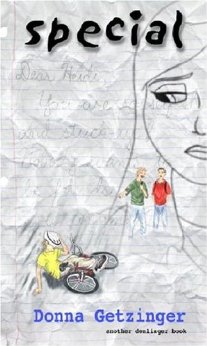 I have some good news: I’ve sold another book! Schoolwide Inc. will be publishing my MG novel No One Needed to Know in their digital library targeted to schools and educators next year. How this all came to be is a story that fits neatly with my Write and Rewrite themed blog. Back in 2004, a tiny little publisher called Denlinger’s Publishers took on my MG novel Special. This was a story based loosely on my experience as a girl with an older Autistic brother. The year this book was released was a hard year for me personally, as my 1st marriage dissolved and I suddenly became a single mother of a 3-year-old and had 3 jobs to make ends meet. I had little time to promote. Then a series of hurricanes hit Florida a couple years later, and they destroyed Denlinger’s facility. They went out of business, and my book went out of print. What to do with a novel that has been published and discarded? I put it in a drawer for a while. Ten years later, I decided that it was time to pull that book out again and tinker with it. I rewrote it by changing it to first person and updating it a touch. Then I started submitting it again under a new title and my new name. I learned about Schoolwide Inc., a 20 year old company dedicated to promoting literacy in classrooms and helping reluctant readers. They were looking to start a line of original content and were open to books that had gone out of print. I sent them mine. To my elation I heard back pretty quickly from one of the editors who told me he loved my book. He wrote glorious things like, “The world needs more books like this. It not only entertains, it educates. And it educates because you have written such an engaging story, with an authentic and sympathetic narrator.” But he followed that with: “While I am very excited about this project and hope to continue working with you on it, I feel that in its current form it is not ready for us to accept for publication.” Oh no! What? “I am inviting you to revise the work and resubmit it for our consideration.” Later, he qualified that it would be a “substantial revision”. His challenge to me was that if I revised the book (mostly by attacking the 2nd half of the book), he would consider publishing it. Oh, and he needed it done by October 1st in order to make the list coming out next year. I looked at the notes he gave me, and they all made perfect sense. I got right to work. Mostly what he wanted was for me to get away from anything that sounded like I was teaching the reader about Austism or Special Needs and stick to the immediacy of the story. I wound up discarding quite a bit, but I added so much more. I wound up tacking on 11,000 words to the book before I was done. I sent it back a couple weeks ago. Today I signed the contract and stuck it in the mail. I’m beyond thrilled that this story gets a second life and will be read by children in schools throughout the country. They have plans to do print versions down the road as well. 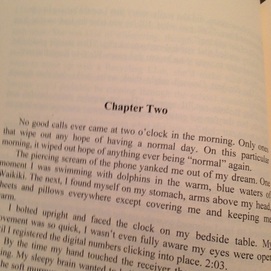 A few weeks ago, I wrote this essay as a guest post on the blog by author Nancy Pennick. In case you missed it there, I thought I'd repeat it here. “No good calls ever came at two o’clock in the morning. Only ones that wipe out any hope of having a normal day. On this particular morning, it wiped out hope of anything ever being “normal” again.” This was supposed to be the opening line of my novel Cry of the Sea. I was so proud of it. So proud! Yes, I envisioned its brilliance being quoted as one of the great opening lines of YA literature at many a writer’s conference for years to come. I loved it so much that no matter what I felt about the rest of the chapter, I was determined to keep that first line. Why was I so sure? Or stubborn? I have attended so many writing workshops and read so many books and articles about the craft of writing novels. Several things have been drummed into my head. “Have a great opening line.” “Hook your reader from the first moment.” “Start where the action is.” “Start your novel where the protagonist’s life changes from its normal routine.” “Start on the day that is different.” And my favorite? “Get to the main point of the plot before page 30.” So, I had this idea for a story about a girl who discovers mermaids caught in an oil spill. Based on everything I’ve learned, that meant she had to find the mermaids before page thirty. I also felt strongly that the story needed to start in the moments just before finding those mermaids. How best to do this? I thought it would be exciting to have her wake up to the alarming news of the oil spill and have her rushing out the door with her environmentalist father to get to the beach. There were some problems with my idea. I had to somehow very quickly introduce my main character and her father, their relationship, and the reason they were going to an oil spill. There was a lot of information to share to have the story make any sense. I thought I’d be clever and get some of that out with a little flashback to the night before in order to explain a few things. Only, that flashback grew from a few paragraphs to a dozen pages before coming back to the big rush to the beach. More important writing advice haunted me: “Don’t have a big flashback in the opening chapter.” “Don’t info dump.” “Show don’t tell.” Oh, poo on all of that. I had an awesome opening line! It had to stay this way. Well… I sent my first chapter to a few agents and editors. No one sent me back praise for my glorious first line. No one requested more pages either. I grew frustrated. Yet, I didn’t revise. I’d already revised the book over and over, and I didn’t know how to do it again. Not without ruining my opening line. The writing advice I knew conflicted in my brain. Bless the team at Fire and Ice, though. They stumbled past my opening chapter and read on to find the story that followed it. They offered to publish the book and sent Megan Orsini, my editor, to help me out. Her very first note to me: “I think the flashback in the opening chapter is too long. I forgot it was a flashback. Why don’t you make that the opening chapter and put the phone call and oil spill scene in chapter two.” But… but… That would put my opening line in chapter two. Do you hear me whining? I knew Megan was right, and I followed her advice. I wound up completely rewriting the whole opening to my book. With her guidance, I actually revised the opening chapter six times and the first page an additional two after that. Now my opening line is: “You ready to see how the next big change in your life is going to look” as asked by June’s father. No, this won’t put me in any lists of great opening lines, but it works. The book works better too. And guess what? We still meet mermaids on page 22. Yay! So, friends, what I’ve learned: don’t marry your words and do trust your editor. With a sly wink, however, I’m happy to announce that a woman who recently reviewed Cry of the Sea on her blog included a quote from my book. Which of my words did she use? My opening line – of Chapter Two. 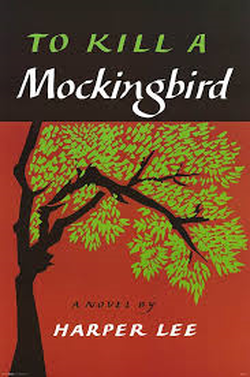 Recently I saw an American Masters special on PBS about Harper Lee, the author of the classic children's novel To Kill a Mockingbird. Like most people, I've always loved the novel and considered it to be "perfect" books that have such depth and wisdom while still being entertaining to read. So, I was a bit startled to find out while watching the biography that this novel didn't flow easily from Lee's pen. She wrote it over a long period of time, and even after a year of dedicated work, quitting her job to devote all her time on it, the book was still not fully formed or publishable. Thankfully, agent Maurice Crain saw magic in her words and concept. Not many agents these days would take on a never published author whose work showed promise but was far from complete. I find that agents at writing conferences are always talking about how they enjoy helping authors mold their pieces, but the guidelines at their websites make it clear that they want books that are as close to publishable as possible. At any rate, Crain accepted her novel and sold it under the working titled of Atticus to editor Tay Hohoff at J. B. Lippencott publishers in New York. Hohoff said that the book was really a collection of short stories when he accepted it. "There were dangling threads of plot, there was a lack of unity - a beginning, a middle, an end that was inherent in the beginning," he remembered in an interview. He also said, "The editorial call to duty was plain." Again, I marvel at the fact that a publisher, knowing the book needed substantial work, took the project on and had faith it would turn out right in the end. With Hohoff's guidance, Harper Lee rewrote her novel three and half times and gave it the new now-famous title before it was ready to publish. It has been conjectured that one of the reasons Harper Lee didn't release a second novel until decades later is due to the fact that Hohoff retired and her agent, Maurice Crain, passed away. She was very reliant upon their help. This quote from Louisa Thomas of Newsweek in her article "Who Helped Harper Lee With Mockingbird?" sums it up: "We like to think of writers, like heroes, as isolated beings. To an extent, it's true; writing is often lonely and painful, a confrontation between the self and the blankness of the page. But a book is also shaped by the system of editors, agents, publishers, teachers, and readers." So, remember as you struggle with your drafts: even the great authors have to revise. 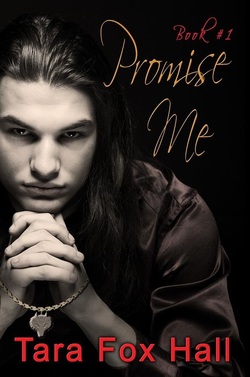 My guest this week is Tara Fox Hall, author of the Promise Me series from Melange Books. She shares her story of a writing workshop intervention that helped get her writing to a publishable level. Tara Fox Hall: To say I needed a lot of help getting my first novel, Promise, ready for publication is an understatement. It was 200K in length, it had punctuation errors, and I tended to use not only repeated words, but also several paragraphs when a few sentences would do. I was lucky enough to qualify for a writer’s workshop through a small press, Wolf-Pirate Publishing, which helped me immensely to work on these problems, as well as others I wasn’t aware of. At first, the criticism was very hard to take, not to mention all the rewriting needed for multiple rounds of edits. But it not only made Promise better and gave me experience with what a real publisher would require, it helped me change the way I wrote, so I didn’t make the same mistakes in new rough drafts I crafted. I also went back through my other works using what I’d learned and made them better. Promise eventually became two books, Promise Me and Broken Promise, which are part of my successful Promise Me Series. Now three years into my writing career, I look back at my first attempts and am glad no one published them. I also keep trying to get better with each new project. Here is a short except from the first final draft of Promise. Someone had tried to kill him and almost succeeded. That someone had involved me, by dumping him so close to my house. And I had done the last thing expected: shelter a total stranger in a basement with no windows. If he had been out all night, he would have been a pile of ashes by now. The truck I would have found today would be empty, and I'd have called the police. They would have come and hauled it away, and that would have been the end of it. My thoughts were manic, but nothing like this had ever happened to me before. I had involved myself in something I had no experience to handle, and I was unused to the feeling. But I was smart, and strong. I’d work out a best course of action, if I thought long enough, and kept my reason. No one knew now even that he was here, except whomever had struck him. Because usually when you try to kill someone, you have a reason. I was gambling here that I had found the good guy, whom some bad guy had hurt. But the opposite could be true. And that led me to the only conclusion it could. I wanted to know what was going on, and why this guy had been dumped here, and who had hurt him. I wanted to know what he was, that he had teeth like that. Plus he was hot, and he was stirring things in me that hadn't been stirred in a while. Okay, a longer than average while. Final Promise Me published version. If the legends were true, someone might have tried to kill him last night. That someone had involved me by dumping him so close to my house. I’d done the last thing expected; sheltered a total stranger in a basement with no windows. If I’d left him outside, he’d be a pile of wet ash by now. The truck would be empty, and I’d have called the police when I went out this morning to check the quarry. They would have come and hauled it away, and that would have been the end of it. My thoughts were manic, but nothing like this had ever happened to me before. I’d involved myself in something I had no experience to handle, and I wasn’t used to the feeling. But I was confident that I’d work it out if I reasoned over it long enough. My more prevailing thought was curiosity. I wanted to know what was going on and why this guy had been dumped here, and who’d hurt him. His sexy appearance stirred things in me that hadn’t been stirred in a while. About Promise Me: When young widow Sarelle McGarren finds the vampire Danial Racklan unconscious and hurt in her woods, intuit concern quickly becomes passionate love. Together, Danial and Sar work to overcome their own past heartbreaks, their vastly different lifestyles, and Danial's relentless enemies. Yet Danial needs more: an Oath of Forever. But can Sar give Danial his greatest desire? Get your copy at: http://www.amazon.com/Promise-Me-ebook/dp/B0086G4GDC http://www.lulu.com/shop/tara-fox-hall/promise-me/paperback/product-20146694.html http://www.barnesandnoble.com/s/tara-fox-hall http://www.melange-books.com/authors/tarafoxhall/index.html Follow Tara Fox Hall: https://www.smashwords.com/profile/view/TaraFH http://www.barnesandnoble.com/s/tara-fox-hall http://www.melange-books.com/authors/tarafoxhall/index.html http://www.goodreads.com/author/show/5286654.Tara_Fox_Hall http://www.amazon.com/Tara-Fox-Hall/e/B005YPAA4W/ www.tarafoxhall.com http://www.goodreads.com/author/show/5286654.Tara_Fox_Hall/blog https://www.facebook.com/pages/Tara-Fox-Hall/151813374904903 https://twitter.com/#!/TerrorFoxHall 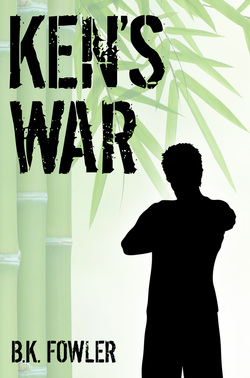 A wonderful guest post today from B. K. Fowler, author of the new historical novel Ken's War. She has some great insight about favorite words that authors tend to overuse. From B. K. Fowler: Every writer has pet words. Tabitha King's pets in The Trap are hooked and hauled, as in "She hooked off her socks," and "He hauled his boots on." Strong verbs used in unconventional ways are refreshing until they’re overworked and become annoying to readers. Pronouns, one breed of pets, are especially vague. "I hate and mistrust pronouns, every one of them as slippery as a fly-by-night personal-injury lawyer," writes Stephen King in On Writing: A Memoir of the Craft. And in The Book Alan Watts refers to the pronoun it is a spook, as in "It's raining outside." What exactly is it? King, Watts and other successful authors use it when it's unavoidable or natural sounding. Character dialogue, for example, sounds natural with a sprinkling of the neuter, singular pronoun. Overusing it causes confusion, as this passage from Lewis Carroll's Alice's Adventures in Wonderland demonstrates. "…The patriotic archbishop of Canterbury found it advisable — " "Found what?" said the Duck. "Found it," the Mouse replied rather crossly: "of course you know what 'it' means." "I know what 'it' means well enough, when I find a thing," said the duck: "it's generally a frog, or a worm. The question is, what did the archbishop find?" If it is one of your pet pronouns, replace it with the true subject of the sentence or phrase. The sentence, “It was the boss who inspected the books,” can be revised as “The boss inspected the books.” (When it disappeared so did other pets--was, who.) Other easily housebroken pets include the rest of the pronoun menagerie: all, some, this, those, they, what, anything, everyone. Other overused words include just, only, really and very. When editing your manuscript, pick a word you used too frequently. Look the word up in a thesaurus for suitable synonyms. Or maybe the word can be deleted. I used just too often, as in “His dad would just have to adapt to Japanese food.” I can replace just. “His dad would simply have to adapt to Japanese food.” Or I can delete just. “His dad would have to adapt to Japanese food.” Housebreak words that piddle on your story. Remove them. Replace them. Or rewrite without them, when possible. Ken’s War by B.K. Fowler: Army brat Ken finds himself in Japan when his hot-headed dad is deployed to a remote post there. Culture clash is one of the many sucker punches that knocks Ken’s world upside down in this coming-of-age novel for teens and young adults. “Ken’s War is vibrant with authority … Fowler’s elegantly written novel risks exploring the full range of teenage behavior and emotion.” Nancy Springer, award- winning author of YA books. Ken's War: When culture shock & teen rebellion collide. http://www.fireandiceya.com/authors/bkfowler/kenswar.html Contact the author of Ken’s War & go behind the scenes at https://www.facebook.com/kenswar Get writers tips and resources at http://writershelper.wordpress.com A couple years ago I learned about a publisher looking for short stories featuring ghosts for an anthology. I whipped out a story, and as usual, it was too long. A friend of mine helped me chop it down to the required word length for submission. I'm not sure why, but I kept my original draft as well as the new one. Well, that's not true, I know why I kept it, I liked some of the extra stuff we cut. Al lot of the "voice" and "character" were in the extra parts, and I knew somewhere deep inside I might want to revisit this story someday.
I was right. My story didn't get picked up for the anthology, and it has sat in my files with all my other failed short stories. (I don't have a mind for short stories and have sold very few of them). Recently, I learned of a publisher looking for YA novellas between 15,000-20,000 words. This story seemed to fit the kind of plot they were looking for, but now it was too short. Luckily, I had kept that slightly longer story, but it was still only 7,000 words. I had to add a minimum of 8,000 words to it to make it marketable. What would that do to the plot? Could the story survive being doubled in length? Would it be better for it or bogged down with too much description and extra stuff. I decided to attempt it. Over the past few weeks I went through my story and added bits here and there to pump the story up and add layers to the plot. In the end, I reached my word count goal. I will submit it to the publisher and keep my fingers crossed. If they say no, the story may sit around for a while again. I'm not sure I can pump it up to a full fledged novel unless I make this story just a piece of a larger plot. At any rate, wish me luck. Here's some examples of what it looked like as a short story and now as a novella. Mark has been getting mysterious notes all morning at school that seem to be advising him as to how to write a proper love note to his girlfriend. He is beginning to wonder where the notes are coming from? See how in the original version he jumps to the conclusion that it is a ghost quickly, whereas in the new version he doesn't. Short Story version of "Passing Notes": Suddenly my heart began to race and painful chills rain down my arms and legs. Someone was communicating with me through those letters. Someone I couldn’t see but was able to see me. A ghost? And more frightening still, I realized that I might lose Bethany before we even got going. I couldn’t eat. I threw my lunch away and headed to my next class where I barely concentrated on the P.E. soccer game. All I could think about were those creepy letters and my stupid cell phone, wondering if I’d get a new message from either of them. I checked everything when I got back to the locker room before I dressed. Not so much as a smiley face from Bethany and no new notes. Novella version of "Passing Notes": My heart began to race and painful chills rain down my arms and legs. Two things had me terrified: I might lose Bethany And Those notes weren’t coincidental. They were meant for me. Whoever it was writing the notes had to be someone really stealthy to be able to slip them into strategic places for me to find and then return to make them disappear again. Also, it was someone with a keen interest in my love life and how I was conducting myself. My friends at my table were busy with their phones or gaming devices; no one was really talking much except to say, “Look at this!” or the occasional cuss. I hadn’t even told any of them about Bethany yet. Even though I’m sure they would cheer me on, none of them had much experience with girls, certainly not enough to give me advice that would be of any value. None of them, as far as I knew, had ever written a love letter or even a poem (that wasn’t required for some English assignment). Plus, none of them were in my classes that morning. Who else would care about the quality of my texts to Bethany? The whole thing had a stalker feel to it. That didn’t make a lick of sense to me, though. I’m not the kind of guy that a girl stalks. I shot up over the summer last year, so I’m not as short as I used to be. The five-year war I’d been fighting with pimples was finally coming to an end. Mom keeps saying that my shoulders are broad like my dad’s, but I’m not sure if that’s a good thing or not. I’ve never thought of myself as one of the good-looking guys, and the fact that Bethany even gave me a chance seemed like a minor miracle. So, who on earth would be interested in me to the point of stalking? Or was it one of those girls like Sadie Jones, who bought all the same clothes as Bethany and tried to imitate her all the time? Girls like her creeped me out. I could believe someone like her would send me weird notes like this to get in the middle of what was going on between Bethany and me. I almost convinced myself of that, and found myself scanning the cafeteria for Sadie to see where she was sitting when another thought hit me. Nether Sadie, nor anyone else for that matter, would have been able to read the texts I sent Bethany. I had been in the back of the room when I sent them, and odds were Bethany didn’t even have her phone out, let alone on, during class. No one could have known what I wrote, and therefore no one could tell me that I wrote the notes badly. Everyone else in the cafeteria was busy talking, eating and cutting up with their friends. No one was looking at me as far I could tell. But I felt like there were eyes on me. Right over my shoulder. The feeling actually made my shoulder tingle, like when someone is too close, and I shrugged uncomfortably. I couldn’t eat. I threw my lunch away and headed to my next class where I barely concentrated on the P.E. soccer game. All I could think about were those creepy letters and my stupid cell phone, wondering if I get a new message from either of them. I checked everything when I got back to the locker room before I dressed. Not so much as an emoticon from Bethany and no new notes. 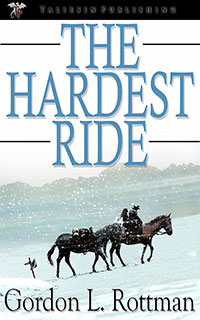 I am inviting authors to visit and share their experiences with revision. My guest today is Gordon L. Rottman, and he writes western and dystopian themed novels. His current published books are The Hardest Ride and Tears in the River from Taliesin Publishing. Like me, he enjoys playing around with POV in his drafts, and here are his thoughts and examples of how he goes about choosing the right tone for his work. Go ahead and send a comment to let Gordon know which version you think will work better for his work in progress. From Gordon L. Rottman: Countless times in writers’ groups and on-line discussion groups we hear, “How do I decide which point of view I use” or “How do I choose the right POV?” For starters, there are no rules, regardless what some many tell you. For example, a “rule” is that young adult books should be 1st person and adult fiction, 3rd person. Ignore that. Let’s say you’re starting a book. No doubt you’ve thought about it a lot and have constructed scenes in your mind. In what POV did you envision those scenes? What sounds right for your protag, her environment and situation? How deep into your protag’s mind do you want the reader to see? Her intimate thoughts or keep her mysterious with questions about her motives or abilities. Another way to decide is a “write test,” like a “screen test” so to speak. Write a chapter or a scene you envisioned. It doesn’t have to be the book’s beginning, any part you want. Write it in the 1st person POV and then write the same scene in the 3rd person. You might give it a day or so between the two “write tests.” Once they’re done, read through them both. Which archives the “feel” or voice you want? You can also take them to your critique group, but remember, they probably do not fully understand the voice you’re looking for. Too, you might have decided which you preferred while writing the two pieces. I started a YA dystopian in 3rd person and six chapters into it I decided I wanted to get deeper into the protags mind. I rewrote the first chapter in the 3rd person, liked it, and converted the rest in a short day. Rather than the common 3rd person for my Western novel, The Hardest Ride (Taliesin Publishing), I went with 1st person as I wanted the reader to see more of the protag’s—Bud’s—personality and emotions. It worked well as it allowed him to be more of a conduit to understanding Marta, a mute 16-year old Mexican girl. In 1st person he could better express how his relationship with the feisty girl evolved. Example: From a work in progress, Blazing Summer. The protag, Ashley, is with a crew undertaking forest firefighter training. Third Person A shovel load of dirt spattered on Ashley’s feet. “Oops. Who didn’t control his shovel?” The Bulldozer was smirking at her. Ashley ignored him. There was gravel in her shoes. Another spray of dirt hit her. “Sorry, I’m sloppy.” “Really. More like so uncoordinated you’d trip over air.” Another shovel full followed, which she daftly sidestepped. She was gritting her teeth. Don’t start anything, she ordered herself. She’d known to expect this. Ashley was ready to dodge the next shovelful, but the instant she swung her pulaski to cut a stob, Bulldozer swung a shovelful at her tool and the dirt hit Matt’s legs to her left making it look like Ashley had caused the flying dirt. “Hey! Watch it!” “Sorry.” She glared at the Bulldozer smoldering. Jenny had seen it all, but ignored it. Finally she shouted, “Control your tool.” The Bulldozer didn’t launch any more misaimed shots. They kept working to the right. Her forearms and shoulders burned. Sweet ran into her dust-filled eyes. Everything’s got to end sometime, she hoped. They’d reached the road after six-hundred feet. They were done. Beth swiped her bandanna over her sweat and dust-covered face and with cheery enthusiasm shouted, “Fresh air, the great outdoors, an aerobic workout, and they’re paying us for this!” Ashley spit out a gob of muddy salvia. Or - First Person A shovel load of dirt spattered on my feet. “Oops. Who didn’t control his shovel?” The Bulldozer was smirking at me. I ignored him. There was gravel in my shoes. Another spray of dirt hit me. “Sorry, I’m sloppy.” “Really. More like so uncoordinated you’d trip over air.” Another shovel full followed, which I daftly sidestepped. I gritted my teeth. Don’t start anything, I ordered myself. I’d known to expect this. I was ready to dodge the next shovelful, but instant I swung my Pulaski to cut a stob, Bulldozer swung a shovelful at my tool and the dirt hit Matt’s legs to my left making it look like I’d caused the flying dirt. “Hey! Watch it!” “Sorry.” I gave Bulldozer what I hoped was a smoldering glare. Jenny had seen it all, but ignored it. Finally she shouted, “Control your tool.” The Bulldozer didn’t launch any more misaimed shots. We kept working to the right. My forearms and shoulders burned. Sweet ran into my dust-filled eyes. Everything’s got to end sometime, I tried to convince myself. We reached the road after six-hundred feet. We were done. Beth swiped her bandanna over her sweat and dust-covered face and with cheery enthusiasm shouted, “Fresh air, the great outdoors, an aerobic workout, and they’re paying us for this!” I spit out a gob of muddy salvia. 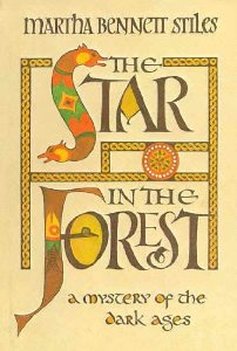 I'm hoping to have many, many authors come visit my blog to tell an experience they've had with editing or revision and share some before and after examples of their work. I'm thrilled that my first guest is a woman I greatly respect, veteran children's author, Martha Bennett Stiles. Martha: In 1978, I sent the manuscript of The Star in the Forest, over which I had labored off and on, for 10 years, to Judith Whipple, then at Four Winds Press. (She had published my first picture book, Dougal Looks for Birds). She returned the manuscript, saying, "Cut it in half and I'll take it. Good ol' Judy can't mean anything so draconian, I told myself, cut 33%, and dispatched it. She sent that MS back by return mail. "I said half," was all she wrote. You can bet I never trifled with her again, and we were happy together until she retired. At least, I was happy. For all I knew, she detested me and was patient for business reasons only. I hope not, because I did like her a lot. What she had found most objectionable about The Star in the Forest’s manuscript was that I described 3 battles and one would have sufficed; I gave the background stories on minor characters when there were quite enough major characters, thank you, to make a book close to too expensive to produce profitably. I described my hero Alarik’s forest journey within an inch of its life and the reader’s. And so on. So I’m grateful to Judy Whipple for making me expunge lots. Even cut as described, the book numbers 206 pages and weighs 9.6 ounces (“You could look it up.”). Of my 12 books, The Star in the Forest is one of my four favorites. School Library Journal gave it a starred review, and Jane Yolen gave it superlatives in her Guide to Writing for Children; I keep both in my prayers. Out of print, the book is offered by AbeBooks for prices ranging from $3.46 to $80.76; by Amazon, from $233 to a penny. An example of what I cut: not exciting and doesn’t advance the plot. The best morels grew under the birch trees along the brook that started somewhere deep in the forest and flowed, always imperceptibly broadening, through the meadows where the lyre-horned cattle grazed, between fields of rustling oat beards and bright wheat, into the river that turned Poijou’s mill. Valrada had gathered mushrooms along this brook all her life. Before she had been old enough to be trusted to know good from poisonous, she had known that when the little pink oak leaves stretched themselves squirrel-ear size, it was time for the harvest that appeared without sowing or tilling. She had soon learned that if she put a basket on her arm, she could toss embroidery hoops aside and wander all afternoon without being frowned at or sighed over, so long as she never brought the basket back absolutely empty. Once Valrada realized she was pretty, she had ceased to long to be a boy, but her strong preference for woods and stable over kitchen and weaving room remained. When the high hedge of beech and thorn that lined her path hid her from the Hall, Valrada took a deep breath, stretched out her basketed arms, and smiled.” Here are 3 paragraphs which made it to the printer: Alarik’s hand tightened on his spear and his lips began to move. Angels that run between the stars, give strength to my horse in this battle, that he shall not be tired and he shall not stumble and no weapon shall touch him and– A roar from the walls and the gates of Poitiers swung open. Rebel cavalry poured out onto the broad causeway, shrieking to God and St. Hilary, and charged the stunned Burgundian foot. Alarik’s lips stopped moving. Snow from Storm’s hoofs splattered Alarik to the waist; the wind whistled past. A neck behind, Lord Eurik was yelling like a madman. He saw Alarik look back and waved his shield. Lord Dag was still between him and Rikimer. The horses swept on with a noise like the surf, flanking the Burgundians. The rebels wheeled and charged to meet them. An arrow whined past Alarik’s shoulder. He ducked his head down further behind his shield and chose his man. The rebel carried his shield low, but Alarik never liked aiming for a face. The head could dodge too easily. Alarik’s spear took the rebel on the shoulder and lifted him out of his saddle. Storm bucked and Alarik freed his spear. He wanted to finish the rebel but a bay was bearing down on him. Storm faced the bay. Its rider’s teeth were bared, his helmet crest stiff like the ruff of a snarling dog. Then his shield hid him. Alark flung his spear underhand and took the bay in the chest. The poor beast crashed on its head: The rider was thrown under Lord Dag’s hoofs. Alarik drew his sword and in the moment he had to breathe, looked back for Lord Eurik. He saw the arrow hit Lord Eurik in the face.” Learn more about Martha Bennett Stiles and her books: www.marthabennettstiles.com http://mbstiles.spaces.live.com Sailing to Freedom 2012 Lonesome Road 1998 One Among the Indians 1962, 2006 So, I've finished going through my new novel and marking all the mistakes and things I want to change. What I discovered above all is that I like to use the word "actually". I use it mostly when people are talking in my book, which makes a little sense. I say "actually" a lot when I talk, and I'm trying to make my teenagers sound realistic. However, it's a little ridiculous after a while. I went through the book and deleted almost all of them.
When my editor helped me through Cry of the Sea, the words she kept circling for me were "just" and "really" and made me get rid of them. I found that I still had those words a lot in this new ms as well Once again I cut them. I'm not sure why I like using qualifiers, but now that I'm aware of them, I see how often they are used in books with little editing (ie: self-published) verses ones that have been edited well. They stand out as if they are in bold print to me now. I recommend that upon finished a draft, use your Find button and put in words like "just", "really", "actually", "seriously" and "very". See how many times they are showing up in your text. Delete them and see if your sentences still work. I can't say that I won't continue to put these useless words in my early drafts in the future. Habits are hard to break. I do hope to never submit a draft to an editor or agent with a manuscript filled with them, though. What are your most commonly use pointless words? Back in 2010 I entered NaNoWriMo for the first time and wrote a 50,000 word novel in one month. Over the following year I revised it and readied it for submissions. It was a contemporary adventure story for boys. I submitted it several places and never got a single request to read past my opening 25 pages. So, I decided last fall that it was time to rethink this story. As much as I liked it, it obviously was missing something. Some higher stakes, perhaps. What if? I asked myself. Instead of my mc being a just-turned 13 year old boy, I made him an almost 15 year old girl. How would that change my plot? How would that affect the other characters in the book? I made the goal of completing this rewrite by the end of March, and here I am on March 31st proudly saying that I have done it. Yes, it still needs some proofreading and tweaking, but the major changes are made. And you know what? It actually is a much better book. It's more exciting and has a lot more oomph to it.
Now I don't suggest everyone do a major change up like this when working on rewrites. However, if something's not working with your story, ask yourself "What if?" and see if a major change is needed. Now I'm back to my WIP to clean it up and get it ready to send to publishers. Wish me luck! |
D. G. DriverAward-winning author of books for teen and tween readers. Learn more about her and her writing at www.dgdriver.com Archives
July 2024
Categories
All
|
Author D. G. Driver's
Write and Rewrite Blog
“There are no bad stories, just ones that haven’t found their right words yet.”
A blog mostly about the process of revision with occasional guest posts, book reviews, and posts related to my books.

 RSS Feed
RSS Feed